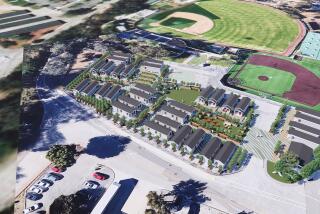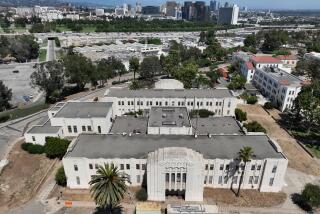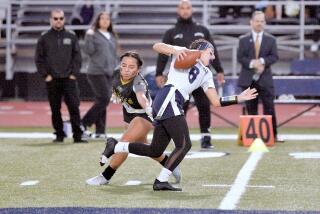Playa Vista finally gets a downtown
Playa Vista was the last major coastal community in Los Angeles to be built, but a crucial retail development to give it its own downtown was stalled by legal challenges. That’s about to change.
With court victories in hand, developers have unveiled the design of a long-anticipated shopping and apartment complex they will begin building in June as the key element of the second and final phase of Playa Vista.
The $260-million project, called Runway at Playa Vista, is intended to be the commercial and social heart of the planned community that has been under construction for more than a decade on land once controlled by aviation mogul Howard Hughes south of Marina del Rey.
Playa Vista already has more than 3,200 residences and 2 million square feet of offices but lacks a commercial and social town center, said Patti Sinclair, co-president of Playa Capital, the master developer of Playa Vista.
Runway will be next to Jefferson Boulevard and house a premium grocery store, 10-screen movie theater, “chef-driven” restaurants and shops. Apartments and office spaces will rise above ground-floor retail shops and top out at four stories.
The complex — about the size of four city blocks — will be mostly completed in about two years, but it is intended to look as if it evolved more slowly over time. Building materials similar to those used on well-known Los Angeles shopping streets such as Abbot Kinney Boulevard and Melrose Avenue will be incorporated, and full-grown native California trees will be brought in to add a sense of permanence.
Canopies will mark entry points, and small gathering areas will be set up around fountains and fire pits. Included in the design by Los Angeles architecture firm Johnson Fain is a 1,400-car garage accessible from Jefferson. There also will be underground parking for the 220 apartments in the first phase of Runway.
Developing Runway is Lincoln Property Co., which has erected office buildings at Playa Vista and is buying the 14-acre Runway site from Playa Capital. The center is intended to serve residents as well as a burgeoning creative office district nearby.
Among the existing and expected office tenants in the neighborhood are broadcaster TMZ, Facebook, Toms shoes, YouTube, Fox Interactive Media and ad agency Deutsch.
The overall 111-acre Phase 2 will include additional housing, offices and other features; construction will be done or underway in about four years, Sinclair said. Playa Vista will then cover 460 acres, less than half the original proposed size because of environmentalists’ dogged opposition.
More than three decades ago, property owner Summa Corp. and its affiliates (all related to the estate of Hughes, the aviator, engineer and film producer) envisioned an immense city within a city on 1,087 acres, with high-rise office buildings, thousands of residences, roadways through the wetlands, a golf course and a regional shopping center.
The first residents arrived in 2002 amid concerns about what would become of the area’s coastal wetlands. The next year, the state approved $140 million to buy nearly 200 acres of the property west of Lincoln Boulevard to be restored and preserved as the Ballona Wetlands. Playa Vista agreed to donate or give up its right to develop an additional 415 acres.
Rex Frankel, who has battled the project from the beginning, successfully challenged the initial environmental impact report and kept the second phase at bay for eight years. Last month, the California Supreme Court declined to take his case over the second and final phase, but he said environmentalists’ efforts were not in vain.
“A project that was seen as a done deal has been made a lot less offensive through our work and that of our partners,” he said Wednesday in an email.
Phase 2 “is the hole of the doughnut,” said Con Howe, a former Los Angeles planning director. “You’ve got the existing residential community, which really feels … like a living, breathing neighborhood. At the eastern end you have the office park.” The second phase, he said, will link the two parts, as was the designers’ and planners’ initial intent.
Although critics have decried some aspects of Playa Vista, notably some of the architecture, the project overall is living up to much of its early promise, Howe said.
“The quality of the streets and landscaping and small public spaces is really superior to what you find in nine out of 10 neighborhoods,” he said.
Howe said the retail space appears to be the appropriate size for serving Playa Vista and some of the surrounding communities.
“No one wanted the retail to be so large and such a draw that it would become its own mall-like destination,” he said. “The … retail will clearly attract some people from the larger area … but it won’t become a big shopping mall. Clearly, the residents will like the additional choices.”
On Wednesday morning, dozens of residents were in evidence on the sidewalks and in the parks. The community features a Los Angeles Public Library branch, swimming pools, a dog park, tennis and basketball courts and a well-used soccer field. The community parks, a freshwater marsh and the restored riparian corridor are open to the public, as is the weekly Saturday farmers market. A Los Angeles public elementary school for children of Playa Vista residents is scheduled to open in August.
Residents are eager for Phase 2’s retail, movie theaters, restaurants and other amenities.
“Can it happen yesterday?” said Stephanie Faust, 29, who along with several other moms was at Concert Park with her 3-year-old son.
“I can’t wait,” Melissa Sills said. “I’m holding my breath.... We’ll never have to leave Playa Vista.” The adoptive mother of a 2-year-old son from Ethiopia, Sills said she enjoys the racial and economic diversity of Playa Vista. She looks forward to the additional parks, the walking path that will run the length of the project and new single-family houses for people with multiple children to “transition up.”
The overall Phase 2 project, known as the Village at Playa Vista, is expected to contain 2,600 residential units plus 200 senior assisted living units, 50,000 square feet of office space, 200,000 square feet of retail, 40,000 square feet of community-serving amenities (including a community center to supplement the one in Phase 1). It will also have 11.5 acres of parks and 12 acres of open space in the riparian corridor and the bluff habitat area.




